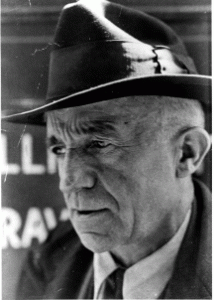Peter Maurin, Co-Founder of the Catholic Worker Movement, died in 1949.
The telephone rang insistently. It had been ringing all day for we were expecting Peter Maurin—co-founder, with Dorothy Day, of the Catholic Worker movement—to come for a lecture. He was also expected to speak elsewhere in the city, at St. Michael’s College. But as yet there was no sign of him. The Catholic Worker, when we phoned long-distance from Toronto to New York, told us that he had left for Canada more than a week ago.
Of course, with Peter Maurin, anything could happen—and usually did. He was that kind of apostle. An article that some- one once wrote about him was entitled “On the Bum,” and that described him very well.
He would start for a city in the north and perhaps wander all through the southern part of the continent to get there. So I was not too worried. But the college was, and so were many people who were anxious and eager to hear this extraordinary man speak. Hence the busy phone.
This time the call had definite news about Peter. He could not phone himself, the caller said. He was being detained on the Canadian border by the immigration authorities. One of the officials was calling. He wanted to know all about Peter. His official voice droned on and on, asking all kinds of questions. We were wondering where all the money would come from to pay for his collect call.
We answered as patiently as we could under the circumstances. Suddenly, the voice changed tone, and became the voice of a normal human being instead of an official. “Lady,” he said, “off the record, is that guy a madman or a saint? I am a Catholic myself, but there he sits in Immigration H.Q., surrounded by all on duty, telling them about God and the Catholic Church—things I never heard before. It sure is interesting but, you know something, if what he is saying is true, I have a lot of reading up to do. How about it, lady?”
I assured the caller that Peter was okay, on the way to sanctity and not madness—unless the madness was the madness and folly of the cross. Then I asked if Immigration would let him in.
Yes, they would, if we came and fetched him and would take responsibility for him while he was in Canada. We said we would. It was then somewhere around 11 p.m.
More phoning—lots more. We got a driver and a car and off we went to Windsor, arriving in the wee hours of the morn-ng to look for Peter. We found him happily discoursing about God, while he ate a substantial meal of coffee, sandwiches and doughnuts provided by Immigration. All were standing around, looking somewhat dazed, listening to him.
Formalities over, we hustled Peter into the car and brought him back in time for Mass and breakfast. It was good to see him come through the Blue Door, which gave him its benediction, as he brought us his. Peter Maurin was an inspiration to thousands and, to my mind, a veritable saint.
I had met him before, but on this occasion he was at his best. He spoke in blank verse of God and the Mother of God, of Jews and gentiles, of justice and injustice. In sharp, concise and precise phrases, as only his wisdom and knowledge could mold them, he spoke of heaven and hell, of workers and management, of the whole social scene and the apostolate of the Church. He spoke of what he really knew. He was that perfect combination of student and worker.
As I listened to him, I thought of how much we of Friendship House owed to him and to Dorothy Day, and to their family of the Catholic Worker. I doubt if I would have persevered in the apostolate were it not for the help of these two burning apostles of God and of his love.
Peter had brought me the vision of the whole that day. To all of us, in fact, he made it crystal clear that we were each re- sponsible for the state of the whole world everywhere, for every person individually and for all collectively. We all, in fact, were our brothers’ keepers.
Under his clear exposition, the doctrine of the Mystical Body became luminous. Peter was like that. He could take sublime verities which, over centuries, had become enveloped in a heavy garment of words, and bring them into the light of day.
Peter’s body rests in a cemetery near New York City, but he lives on in the hearts of those who feast on his Easy Essays. Yes, it was a blessed day when he passed through the Blue Door of Friendship House.
Peter Maurin, pray for us.
From Not Without Parables by Catherine Doherty, pp. 61-63. Catherine Doherty founded the Madonna House Apostolate.
© Madonna House Publications 2007. www.madonnahouse.org/publications


